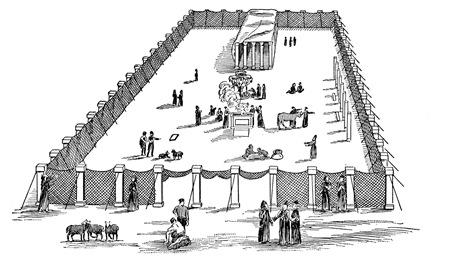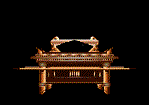| New Life Bible Course 3 >>> |
|
NEW LIFE BIBLE
STUDY |
LESSON 3 of 5 |
OLD TESTAMENT TYPES AND SHADOWS OF SALVATION II
We have seen how that the blood, water, and Spirit agree in one in revealing God's wonderful plan of salvation. We shall see two more examples in this lesson.
THE TABERNACLE PLAN |
 |
During Israel's journey to the promised land, they stopped at Mount Sinai, where God gave to Moses the two tablets of stone with the ten commandments written upon them. He also gave to Moses the Law, the priesthood, and His plan for a tabernacle to be built. He was ordered by the Lord concerning the tabernacle: "According to all that I shew thee, after the pattern of the tabernacle, and the pattern of all the instruments thereof, even so shall ye make it" (Exodus 25:9).
This was extremely important, because the tabernacle and everything
in it was a type and shadow of Jesus Christ, His church, and the plan
of salvation (Hebrews 8:5). Briefly, the tabernacle was surrounded by
a white linen fence. A veil in the tabernacle served to divide the tabernacle
into two rooms. The first room was called the holy place, and the second
room was called the most holy place.
Outside the tabernacle, directly in front of the gate, was the brazen
altar. This is where animals were killed, and the blood was shed. All
of the pieces of furniture were arranged so that if vertical and horizontal
lines joined them, they would be in the shape of a cross!
Between the brazen altar and the tabernacle, in a direct line, was the brazen laver of water. After the priests killed the animal sacrifice, they were required to wash at the laver of water. If they did not, they would die! Inside the tabernacle were three more objects: the lamp stand (on the left), a type of Jesus Christ, the light of the world; the table of shewbread (on the right), a type of Jesus Christ, the Bread of Life, and right before the veil was the altar of incense, where incense (a type of praise and prayer) was offered to the Lord daily by the priests.

The only object inside the most holy place was the ark of the covenant. Once a year (on the Day of Atonement), the priest would kill an animal and offer it as a sacrifice at the brazen altar. Then he would wash at the brazen laver of water, and bring the blood of the animal into the most holy place and sprinkle it upon the mercy seat, which was on the lid of the ark. Then the glory of God would descend and fill the tabernacle. This was the greatest day of the priest's life--to experience the glory of God. But this could only take place once a year, and he must take his turn, as there were other priests! The glory of God is the Spirit of God!
What was necessary to bring down the glory of God (the Spirit of God)? The blood and the water! The brazen altar where the animal was sacrificed was the place of death. It represents true repentance. When we truly ask God to forgive us of our sins, and tell Him that we will fully obey Him, we die out to our sins. The brass laver of water represents baptism. The altar in front of the vail is where incense was offered. This is a type of praise and worship. After we have repented of our sins, and have been baptized in Jesus' Name, we should offer praise to God because He has forgiven us. As we sincerely do this, the glory of God will fill our holy place (our hearts are made holy by the blood, and we are washed by the waters of baptism). We will receive the Holy Ghost!
Exodus, Chapters 25 through 27 gives us the details concerning the tabernacle.
THE REVIVAL AT MOUNT CARMEL
The children of Israel had fallen into sin. Even though they still believed
in Jehovah God, they had forsaken the commandments of the LORD, and
were worshipping Baal (I Kings 18:18). Elijah called all Israel and
the prophets of Baal, and the prophets of the groves to Mount Carmel.
Then he challenged them: "And Elijah came unto all the people,
and said, How long halt ye between two opinions? If the LORD be God,
follow him: but if Baal, then follow him (verse 21).
The people did not answer him one word, but Elijah proceeded to issue the challenge and give them a plan that would cause them to return to God: ". . . I, even I only remain a prophet of the LORD; but Baal's prophets are four hundred and fifty men. Let them therefore give us two bullocks; and let them choose one bullock for themselves, and cut it in pieces, and lay it on wood, and put no fire under: and I will dress the other bullock, and lay it on wood, and put no fire under: And call ye on the name of your gods, and I will call on the name of the LORD: and the God that answereth by fire, let him be God. And all the people answered and said, It is well spoken" (I Kings 18:22-24).
Then Elijah ordered the false prophets of Baal to offer their sacrifice first and call upon the name of their gods. This they did from morning unto noon. "But there was no voice, nor any that answered" (verse 26). Then Elijah began to mock them: ". . . Cry aloud: for he is a god; either he is talking, or he is pursuing, or he is in a journey, or peradventure he sleepeth, and must be awaked" (verse 27).
The false prophets even cut themselves with knives and lancets, in an effort to get Baal to send fire upon their sacrifice, but nothing happened! They were so angry with Elijah, that they torn down his altar, and it was necessary for Elijah to repair it. Then he called the people to come near. What he did next is important, because by his action the nation of Israel returned to God. Remember that Paul wrote concerning the nation of Israel:
"Now all these things happened unto them for ensamples: and they are written for our admonition, upon whom the ends of the world are come" (I Corinthians 10:11).
The first thing Elijah did was to take twelve stones and build an altar "in the name of the LORD." Then he made a trench around the altar. Then he "put the wood in order, and cut the bullock in pieces, and placed him on the wood." Then he did something very strange. He called for three barrels of water to be poured upon the sacrifice and the wood. This was done three more times, until the water had soaked the sacrifice and the wood, and filled the trench.
Then it was time for the evening sacrifice, time for him to pray. His prayer was very short:
"Lord God of Abraham, Isaac, and of Israel, let it be known this day that thou art God in Israel, and that I am thy servant, and that I have done all these things at thy word. Hear me, O LORD, hear me, that this people may know that thou art the LORD God, and that thou hast turned their heart back again" (I Kings 18:36-37).
This prayer can be prayed in fifteen to twenty seconds, but it was effective, because of his obedience to the Lord. Notice that he said concerning everything he had done, "I have done all these things at thy word." What was the result of his obedience and prayer?
"Then the fire of the LORD fell, and consumed the burnt sacrifice, and the wood, and the stones, and the dust, and licked up the water that was in the trench. And when all the people saw it, they fell on their faces: and they said, The LORD, he is the God; the LORD, he is the God" (verses 38-39).
THE LESSON FOR US
Fire in the Bible is symbolic of the Holy Ghost. John said concerning
Jesus, "He shall baptize you with the Holy Ghost, and with
fire:" (Matthew 3:11). Fire is symbolic of power. Jesus said,
"Ye shall receive power, after that the Holy Ghost is come
upon you" (Acts 1:8).
The Holy Ghost fire only comes to prepared hearts. Elijah repaired the broken altar. This is a type of sincere repentance. Then he "put the wood in order." He did not just throw it on the altar, he put it in order. By true repentance we "put the wood in order;" that is, we make sure that our relationship is right with God, and with man. When we repent, we need to make sure that we forgive every person that has hurt us or "done us wrong," because Jesus said, "If ye forgive not men their trespasses (sins), neither will your Father forgive your trespasses (sins)" (Matthew 6:15).
Then he slew the animal and placed it upon the wood, because if restoration and renewing came to the nation of Israel, there must be blood!
His next act was to call for the water--lots of it, not only to make the miracle greater, but because it was a type of our salvation. Twelve barrels of water completely soaked the wood and the sacrifice, and filled the trench.
Everything that had been done thus far, was his own personal act. God had not done one thing except give the command that Elijah obeyed. When it was time for the fire, this was something Elijah could not do, nor was he supposed to do. God gave the fire, which we have already stated is a type of the Holy Ghost.
God wants us to do all we can to prepare the altar of our hearts for His divine presence:
1. We do the repenting--dying out to our sins. The blood!
2. The preacher does the baptizing. The water!
3. God gives us His beautiful Holy Ghost. The Spirit! ds
--------------------------------------------------------------------------------
NEW LIFE BIBLE COURSE I - - - - - - - - - - - - - - - - -
- - - - -- - - LESSON THREE TEST
1. The blood, water, and Spirit agree in one in:
2. The tabernacle, and everything in it was a type and shadow of:
3. The lamp stand or candlestick was a type of Jesus as:
4. The table of shewbread was a type of Jesus as:
5. The brazen altar represents true ____________________.
6. The brass laver of water represents __________________________.
7. As we offer praise to God because He has forgiven us ____________will
fill our holy place.
8. Even though the children of Israel still believed in Jehovah God,
they had
__________ the commandments of the LORD and were worshipping _________.
9. Elijah called _______________________________________to Mount Carmel.
10. What challenge did he give the people in verse 21?
11. Elijah said, "The God that answereth ________________ let him __________________.
12. How long did the false prophets call upon the name of their gods?
13. Did their gods hear them?
14. What did Elijah say when he mocked them?
15. What was the first thing that Elijah did?
16. Name the next three things that he did?
17. How long was the prayer that he prayed?
18. Fire is symbolic of:
19. The Holy Ghost fire only comes to _______________________________.
20. God wants us to do all we can to prepare our _____________ for His _________.